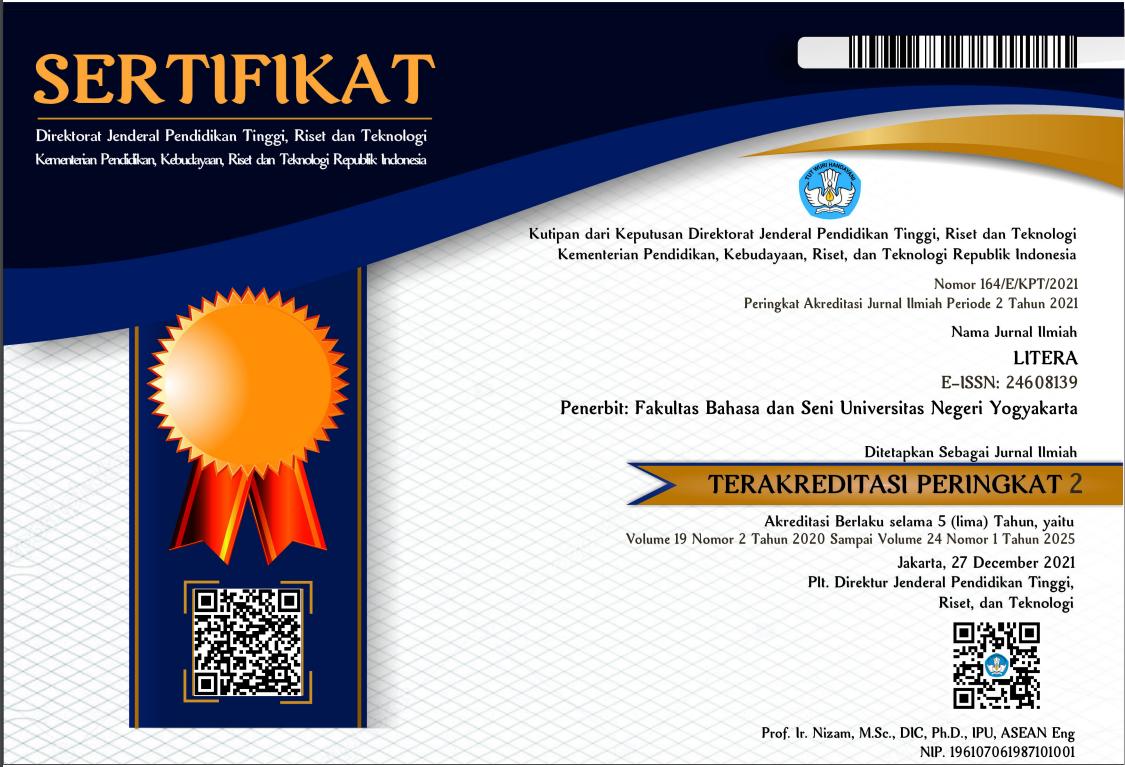REPRESENTATION OF CULTURE ECOLOGY IN WISRAN HADI’S PERSIDEN, GENERASI KETUJUH
Candra Rahma Wijaya Putra, Universitas Muhammadiyah Malang, Indonesia
Abstract
Culture and humans are interdependent and fused by ecological processes and natural energy cycles. The author as the creator of the work cannot be separated from the cultural environment from which it originates. This study aims to reveal (1) cultural elements and (2) representation of cultural ecology in the novel. The material object of this study is Wisran Hadi's Persiden, Generasi Ketujuh novel. The uses a qualitative descriptive method that describes the research subject based on the facts of the visible cultural ecology. Data analysis of the study is done by classifying data, categorizing data, and finding important issues related to the study of cultural ecology. In addition, it is also supported by interactive-dialectical analysis or back and forth to track the overall findings. The results of the study reveal that (1) the universal element of culture (cultural system) is the basis for discussion of cultural ecology. The cultural system is very dominant and even becomes the author's frame of mind in presenting the reality of life in his work. The strengths and relations built by each system represent the operation of cultural ecology in literature; (2) cultural ecology can be considered through a shift in people's mindsets in adapting to their environment. This adaptation has implications for the division of community groups into two. First, one community makes adaptation by maintaining local identity, namely tradition. Second, other societies make adaptation by leaving the tradition to the modern (global) trend.
Keywords: culture ecology, elements of culture, adaptation
Full Text:
PDFReferences
Dewi, N. (2015). Manusia dan Lingkungan dalam Cerpen Indonesia Kontemporer: Analisis Ekokritik Cerpen Pilihan Kompas. Jurnal Litera, 14(2), 376-391, (https://journal.uny.ac.id/index.php/litera/article/view/7211/6216).
Fadillah. (2015). Ragam Wacana Bahasa Sastra dan Budaya. (N. M. D. Erfiani, Ed.). Yogyakarta: Pustaka Pelajar.
Faruk. (1995). Peralawan Tak Kunjung Usai. Yogyakarta: Pustaka Pelajar.
Hadi, W. (2013). Persiden. Yogyakarta: PT Bentang Pustaka.
Hadi, W. (2008). Generasi Ketujuh. Padang: Kabarita
Kadarisman, A. E. (2010). Mengurai Bahasa Menyibak Budaya: Bunga Rampai Linguistik, Puitika, dan Pengajaran Bahasa. Malang: UM Press.
Koentjaraningrat. (2002). Pengantar Ilmu Antropologi. Jakarta: Rineka Cipta. Jakarta: Rineksa Cipta.
Kumbara, N. A. G. S. (2012). Wacana Antropologis. Membaca Ulang Teks Kebudayaan Menuju Transformasi Diri dalam Multikulturalisme. Denpasar: Pustaka Larasan.
Nurgiyanto, B. (2016). Transformasi Cerita Wayang dalam Novel Amba dan Pulang. Jurnal Litera, 15(2), 201-216, (https://journal.uny.ac.id/index.php/litera/article/view/11823).
Ratna, N. K. (2013). Paradigma Sosilogi Sastra. Yogyakarta: Pustaka Pelajar.
Saryono, Djoko. (2016). Pendekatan Multikultural dalam Pembelajaran Bahasa dan Sastra Indonesia. Makalah Seminar Nasional Membina Karakter Manusia Berbudaya Menuju Bangsa yang Berkemajuan Melalui Pembelajaran Bahasa dan Sastra Indonesia. Malang: Universitas Muhammadiyah Malang.
Sayuti A Suminto, Else Liliani, K. (2018). Profil Sastrawan Kampus Universitas Negeri Yogyakarta. Jurnal Litera, 17(3), (https://journal.uny.ac.id/index.php/litera/article/view/22015).
Syam, Eva Yenita. 2017. Makna Budaya Minangkabau dalam Novel Tamu Karya Wisran Hadi. Jurnal Jentera, 6 (2), 163-180, (http://ojs.badanbahasa.kemdikbud.go.id/jurnal/index.php/jentera/article/view/438).
Soerjono, S. (2001). Sosiologi: Suatu Pengantar. Jakarta: Grafindo Persada.
Sutton, M. Q., & Anderson, E. N. (2014). Introduction to Cultural Ecology. Maryland: Alta Mira Press.
Sudarmoko. 2016. Sastra, Kota, dan Sumatera Barat: Perubahan Masyarakat Perkotaan dalam Karya Sastra. Jurnal Jentera, 5(1), 22-41, (http://ojs.badanbahasa.kemdikbud.go.id/jurnal/index.php/jentera/article/view/347).
Suwandi, Sarwiji, Ahmad Yunus, dan L. E. R. (2016). Kecerdasan Ekologis Dalam Buku Sekolah Elektronik Mata Pelajaran Bahasa Indonesia SMP. Jurnal Litera, 15(1), 23-37, (https://journal.uny.ac.id/index.php/litera/article/view/9763).
Upstone, S. (2009). Spatial Politics in the Postcolonial Novel. Ashgate: Surrey.
Wibowo, A. (2013). Pendidikan Karakter Berbasis Sastra. Yogyakarta: Pustaka Pelajar.
Wicaksono, Andri. 2016. Kearifan pada Lingkungan Hidup dalam Novel-Novel Karya Andrea Hirata (Tinjauan Strukturalisme Genetik). Jurnal Jentera, 5(1), 7-21, (http://ojs.badanbahasa.kemdikbud.go.id/jurnal/index.php/jentera/article/view/346/0).
Zapf, H. (2010). Ecocriticism, Cultural Ecology, and Literary Studies. Jurnal Ecozona, 1(1), 136–147, (ecozona.eu/article/download/332/307).
DOI: https://doi.org/10.21831/ltr.v18i1.20579
Refbacks
- There are currently no refbacks.
______________________
__________________________________________________________________________________________________
Litera Journal is published by the Faculty of Languages, Arts, and Culture Universitas Negeri Yogyakarta in collaboration with Himpunan Sarjana Kesusasteraan Indonesia (HISKI)
The International Journal of Linguistic, Literature, and Its Teaching at http://http://journal.uny.ac.id/index.php/litera/ is licensed under a Creative Commons Attribution-ShareAlike 4.0 International License
__________________________________________________________________________________________________















